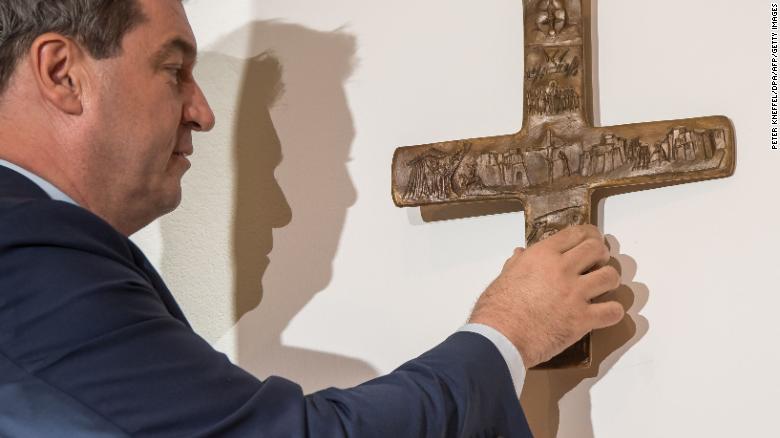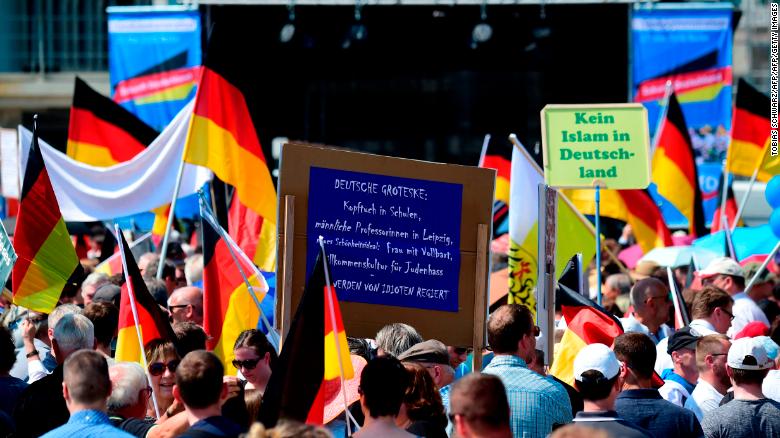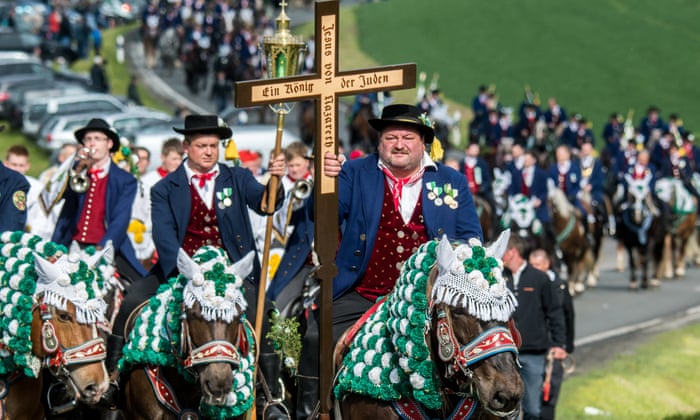German Reaction : Tradition!
"The cross is a fundamental symbol of our Bavarian identity and way of life. It stands for elementary values such as charity, human dignity and tolerance."
"[The] cross is not a sign of religion [but of identity and culture; its display not a] violation of the principle of neutrality [by state authorities]."
Bavarian Premier Markus Soder, Christian Social Union
 |
| Markus Soder, Bavarian state premier, hangs a cross in the entrance area of the Bavarian State Chancellery in April |
"This is not so much about where you hang a cross but where you make a cross on Election Day."
"Maybe all those who speak in the name of offended Muslims should check what those Muslims actually think."
Ugur Bagislayici, Turkish-Bavarian, Deggendorf, Germany
"Islam does not belong to Germany. Germany was shaped by Christianity."
"The Muslims who live among us naturally do belong to Germany. Of course, that does not mean that we should, out of a false consideration of others, give up our traditions and customs. Muslims need to live with us, not next to us or against us."Bavarian CSU leader Horst Seehofer, German Ministry of Interior and "Heimat"
 |
| At an AfD rally on May 27, supporters hold placards reading "No Islam in Germany." |
In Bavaria, the most conservative and religious geographic area in Germany, the new conservative premier, Markus Soder issued an official order that crosses are to be hung everywhere in public spaces in Bavaria, in town offices in throughout the area, in the entrance of every state building in Bavaria, in police stations and schools and anywhere in public where the public gathers or receives state services, in honour of heritage and culture, not necessarily religious devotion, he insists.
On the other hand, had Germany not absorbed a million 'refugees' and economic migrants from Muslim countries escaping persecution, oppression, unemployment and conflict to seek opportunities to advance elsewhere, particularly in wealthy, social-minded, progressive European countries like Austria and Germany, it is doubtful that even Bavaria would be interested in promoting the visual clarification that public crosses represent. Germany already had a population of four million Muslims before the 'refugee' invasion.
Mr. Soder's Christian Social Union is preparing for October state elections where a challenge is being mounted by the anti-Muslim Alternative for Germany group, gaining adherents in Catholic Bavaria, campaigning on mistrust of the presence of such huge numbers of Muslims who, finding themselves in Europe, and away from their countries of birth, are clinging to fundamentalist Islam, hoping that Sharia will be incorporated into German law. It is fear of Germany's native culture and heritage being overtaken by a suffocating presence of Muslims that motivates the new resistance against Islam.
Turkey and particularly Recep Tayyip Erdogan, seems to feel a particular 'ownership' of countries where expatriate Turks live, investing heavily in building mosques, and influencing the Turkish populations living in Europe. During Turkish election campaigns Erdogan expects to be able to send political representatives abroad to electioneer and to invite Turks to cat their ballots as though they are primarily Turkish citizens, and not dual citizens of the Europe in which they live.
The European Court of Human Rights ruled in 2011 that a publicly displayed cross represented "a passive symbol", leading Germany to follow a role agreeing to the display of crosses -- unless someone is sufficiently offended to challenge their presence, which rarely occurs. Conservatives in Bavaria identify critics of the new cross-placement decree as "enemies of religion", but according to opinion polls most Bavarians favour the initiative which took effect June 1.
According to a recent survey by the Pew Research Center, more than one in two Germans who are practising Christians believe that Islam is not compatible with German values and culture. Echoing the statement by Interior Minister Horst Seehofer a former Bavarian premier, that "Islam is not part of Germany", since Germany's values were "shaped by Christianity". The Turkish community is a long established one comprised of guest workers arriving in the 1960s.
 |
| Traditionally clad Bavarians take part in the annual Koetzing Pentecost Ride. Photograph: Armin Weigel/EPA |
Labels: Bavaria, Christianity, Controversy, Germany, Immigration, Islam, Migrants, Political Realities, Refugees

<< Home